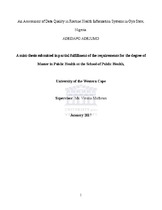| dc.contributor.advisor | Mathews, Verona | |
| dc.contributor.author | Adejumo, Adedapo | |
| dc.date.accessioned | 2017-07-19T13:54:34Z | |
| dc.date.available | 2017-07-19T13:54:34Z | |
| dc.date.issued | 2017 | |
| dc.identifier.uri | http://hdl.handle.net/11394/5497 | |
| dc.description | Magister Public Health - MPH | en_US |
| dc.description.abstract | Ensuring that routine health information systems provide good quality information for informed decision making and planning in health systems remain a major priority in several countries and health systems. The lack of use of health information or use of poor quality data in health care and systems results in
inadequate assessments and evaluation of health care and result in weak and poorly functioning health systems. The Nigerian health system like in many developing countries has challenges with the building blocks of the health system with a weak Health Information System. Although the quality of data in the Nigerian routine health information system has been deemed poor in some reports and studies, there is little research based evidence of the current state of data quality in the country as well as factors that may influence data quality in routine health information systems. This study explored the data quality of routine health information generated from health facilities in Oyo State, Nigeria, providing the state of data quality of the routine health information. This study was a cross sectional descriptive study taking a retrospective look at paper based and electronic data records in the National Health Management Information System in Nigeria. A mixed methodology approaches with quantitative to assess the quality of data within the health information system and qualitative methods to identify factors influencing the quality of health information at the health facilities in the district. Assessment of the quality of information was done using a structured evaluation tool looking at
completeness, accuracy and consistency of routine health statistics generated at these health facilities. A multistage sampling method was used in the quantitative component of the research. For the qualitative component of the research, purposive sampling was done to select respondents from each health facility to describe the factors influencing data quality. The study found incomplete and inaccurate data in facility paper summaries as well as in the electronic databases storing aggregate information from the facility data. | en_US |
| dc.language.iso | en | en_US |
| dc.publisher | University of the Western Cape | en_US |
| dc.subject | Health information | en_US |
| dc.subject | Use of information | en_US |
| dc.subject | Data quality | en_US |
| dc.subject | National Health Management Information System (Nigeria) | en_US |
| dc.subject | Routine data quality assessment | en_US |
| dc.subject | Nigeria | en_US |
| dc.title | An assessment of data quality in routine health information systems in Oyo State, Nigeria | en_US |
| dc.rights.holder | University of the Western Cape | en_US |

